See other ObamaNation Articles
Title: Gold Could Reach Bruce Willis Level Soon
Source:
zerohedge/CAPITALIST EXPLOITS
URL Source: https://www.zerohedge.com/news/2023 ... -reach-bruce-willis-level-soon
Published: Jan 3, 2023
Author: Chris MacIntosh | Insider 262
Post Date: 2023-01-03 16:17:02 by Esso
Keywords: None
Views: 179
Comments: 1
GOLD And yet there are the rumours of his multiple homes, maybe even a private jet, and dealings with the “underworld.” He’s the uncle nobody really wants to get to know but then still wants to know who he is. They don’t want to find out. They just want to be told so they know. Finding out may entail something to do with that mortality thing. So he remains an enigma while sitting right there sipping his whisky silently watching everyone like they’re ants in a jar. Gold’s been sitting there silently for a long time and everyone knows the rumours. Really, it’s actually an absolute gangsta. Just you wait! Thing is, you could go many decades without seeing gold be a gangsta. Sure, gold has bull and bear runs, along with all other cyclical commodities, and don’t get me wrong, they have proven to be rather kind to us here at HQ, but that’s not what I’m talking about. I’m talking about Bruce Willis level. We may be approaching such a time. Why now? I’ve always said gold as a monetary instrument best moves on a loss of faith in the prevailing currency system. You may recall we discussed this in the past showing you how when pricing gold in currencies other than the greenback was proving rather gangsta-like. Except that the world still works in US dollars. It is a move out of the dollar that everyone keeps anticipating. Truth is, it really can’t go into gold. Gold has an estimated total market capitalization of $11.5 trillion. That is the estimated gold market cap, calculated based on the current price ($1,806.5) and the world’s above-ground gold reserves, which are 201,296.1 tonnes (end-2020), according to the WGC (World Gold Council). Golds market cap is a pimple on the face of the roughly $127 trillion global bond market. For some perspective, you can check out Visual Capitalist, who put out some really neat charts. My point is that the money can’t all move into gold. But it can move into an SDR-type instrument which itself trades based on the pricing of gold as well as a number of other commodities. Here I introduce you to one Sergey Glazyev, one of the most influential economists in the world — a member of the Russian Academy of Sciences and a former adviser to the Kremlin from 2012 to 2019, who, for the past three years, has helmed Moscow’s uber strategic portfolio as Minister in Charge of Integration and Macroeconomics of the Eurasia Economic Union (EAEU), a topic covered last week. Here is what Sergey has to say about the structure of a currency system initially utilised by the BRICS, but not exclusive to them — all being welcome to join. In the first phase of the transition, these countries fall back on using their national currencies and clearing mechanisms, backed by bilateral currency swaps. At this point, price formation is still mostly driven by prices at various exchanges, denominated in dollars. This phase is almost over: after Russia’s reserves in dollars, euro, pound, and yen were “frozen,” it is unlikely that any sovereign country will continue accumulating reserves in these currencies. Their immediate replacement is national currencies and gold. The second stage of the transition will involve new pricing mechanisms that do not reference the dollar. Price formation in national currencies involves substantial overheads, however, it will still be more attractive than pricing in ‘un-anchored’ and treacherous currencies like dollars, pounds, euro, and yen. The only remaining global currency candidate – the yuan – won’t be taking their place due to its inconvertibility and the restricted external access to the Chinese capital markets. The use of gold as the price reference is constrained by the inconvenience of its use for payments. The third and the final stage on the new economic order transition will involve a creation of a new digital payment currency founded through an international agreement based on principles of transparency, fairness, goodwill, and efficiency. I expect that the model of such a monetary unit that we developed will play its role at this stage. A currency like this can be issued by a pool of currency reserves of BRICS countries, which all interested countries will be able to join. The weight of each currency in the basket could be proportional to the GDP of each country (based on purchasing power parity, for example), its share in international trade, as well as the population and territory size of participating countries. In addition, the basket could contain an index of prices of main exchange-traded commodities: gold and other precious metals, key industrial metals, hydrocarbons, grains, sugar, as well as water and other natural resources. To provide backing and to make the currency more resilient, relevant international resource reserves can be created in due course. This new currency would be used exclusively for cross-border payments and issued to the participating countries based on a pre-defined formula. Participating countries would instead use their national currencies for credit creation, in order to finance national investments and industry, as well as for sovereign wealth reserves. Capital account cross-border flows would remain governed by national currency regulations. So in this setup it stands to reason that key commodities automatically have an underlying bid due to them being viewed not only as vehicles of utility but as monetary instruments. In addressing the question of existing dollar based liabilities (the Achilles heel of all emerging markets), Glazyev had this to say (emphasis mine): Transition to the new world economic order will likely be accompanied by systematic refusal to honor obligations in dollars, euro, pound, and yen. In this respect, it will be no different from the example set by the countries issuing these currencies who thought it appropriate to steal foreign exchange reserves of Iraq, Iran, Venezuela, Afghanistan, and Russia to the tune of trillions of dollars. Since the US, Britain, EU, and Japan refused to honor their obligations and confiscated the wealth of other nations which was held in their currencies, why should other countries be obliged to pay them back and to service their loans? In any case, participation in the new economic system will not be constrained by the obligations in the old one. Countries of the Global South can be full participants of the new system regardless of their accumulated debts in dollars, euro, pound, and yen. Even if they were to default on their obligations in those currencies, this would have no bearing on their credit rating in the new financial system. Nationalization of extraction industry, likewise, would not cause a disruption. Further, should these countries reserve a portion of their natural resources for the backing of the new economic system, their respective weight in the currency basket of the new monetary unit would increase accordingly, providing that nation with larger currency reserves and credit capacity. In addition, bilateral swap lines with trading partner countries would provide them with adequate financing for co- investments and trade financing. Now, it’s important to realise that the urgency of many countries that are vassal states of the Western based banking system (up to their eyeballs in IMF loans) to find an alternative is only increasing as the Fed keep ratcheting rates higher. Just look at this from the perspective of a country that has to service dollar based loans. They are doing so with a falling currency, and not only that, but the interest rate in dollars itself is rising. This is quickly becoming unmanageable. It’s why we’ve predicted that 2023 will likely be the year of emerging market sovereign debt defaults. Now, if you see this shitstorm approaching, and — as dumb as many central bankers are — we tend to think they must see this coming, then there are two solutions. One is to scramble about and obtain dollars in order to try to service the debt. This option becomes problematic when all participants are doing so, pushing the dollar higher and interest rates higher (more demand for dollars), and the second option is what Glazyev is talking about. It’s wild for sure but not unthinkable. And the market sure isn’t pricing this. That’s the sort of setup we like. Where, if nothing happens, well… meh, it’s already priced for nothing to happen. But, if something of this nature transpires, then we could be in for some real fireworks, because as mentioned earlier — the basket of commodities we’re talking about are already the cheapest asset classes on the planet on both a relative and absolute basis. This brings me to central bank purchasers. Bloomberg’s Daily Shot ran this recently. And Zerohedge talked about how the Chinese were, in fact, a significant buyer of gold as it turns out. Here’s something that seems entirely missed though. China produces 600mt of gold per year and has done so for many years. This is gold which never leaves China and yet now, when they mention they’ve increased their reserves by 32mt in three years, the financial media all get their panties in a bunch. “Oooh look, the Chinese are buying. They’re buying!!” Folks, as you can see, that amount is pretty meaningless when considering what I just mentioned. Never mind the massive gold imports, including 1,000 mt per month, for 30 consecutive months starting in 2012. Anyway, my point is this. When governments lie about everything else, why would we ever trust what they say about their gold holdings? Only a fool would do so. I think it’s safe to say that after the West stole Russians’ FX reserves, it sent a message to the rest of the world. Your assets are no longer safe in our hands. Rule of law be damned! This brings me to another topic which we’ve covered in the past here and is now worth bringing back into the limelight. This is that countries can bypass the IMF and trade goods for goods. They can actually do this in USD, but now the problem lies in them pissing off Western masters who control the banking systems, allowing for this trade to take place. Trade really requires something they can all trust and is stable. That’s step 1, and step 2 is the need for that system to be outside of the West who are threatening them. Ghana plans to buy oil with gold instead of U.S. dollars Ghana’s government is working on a new policy to buy oil products with gold rather than U.S. dollar reserves, Vice-President Mahamudu Bawumia said on Facebook on Thursday. The move is meant to tackle dwindling foreign currency reserves coupled with demand for dollars by oil importers, which is weakening the local cedi and increasing living costs. Ghana’s Gross International Reserves stood at around $6.6 billion at the end of September 2022, equating to less than three months of imports cover. That is down from around $9.7 billion at the end of last year, according to the government. There ya go! Speaking of threats and yet another accelerant to some sort of transition taking place… Speaking at the Africa Energy Week in Cape Town, Ghanaian minister of energy Matthew Opoku Prempeh remarked that over 80% of the oil and gas exported from Africa ends up in Europe, China, and India. Africa accounts for just 2% to 3% of global emissions, while 640 million Africans have no access to energy – equivalent to an electricity access rate of just over 40%. Natural gas accounted for 39% of Africa’s electricity generation mix in 2019, followed by coal (29%), hydro (15%), and oil (10%), according to the African Energy Chamber. Nuclear accounts for another 2% and renewables for about 5%. The argument put forward here and one echoed by dozens of countries in the emerging markets is simple. The West has largely completed its industrialisation powered by fossil fuels, yet Africans are now being held in poverty for the sake of environmental extremists in the West who can’t even provide for their own energy needs, let alone Africa’s. The West is imposing its own environmental priorities on countries that are still working on providing the basics to their people — food, infrastructure, internet connectivity, and energy. “A growing number of Western countries are making their aid packages contingent on going ‘green’ when African nations simply can’t afford it,” says Ayuk. “In such a situation, the West cannot be surprised if such nations begin turning to countries like China and its Belt and Road Initiative for cheap capital with no environmental strings attached.” Ooh! Careful, Ayuk! It’s almost like they don’t want to be dealing with the West anymore. Time to bring some “democracy” to your country. Some much needed “regime” change. Might be smart to stay away from small aircraft. Just saying. So what does all of this geopolitical argy-bargy have to do with gold? Well, in order to facilitate trade, what is desperately needed is some form of currency system that is NOT going to land some country like Ghana with frozen assets because they haven’t paid a fart tax to save the planet and instead gone about trading energy or food or whatever outside of any system which would place them in a precarious position. In other words outside of SWIFT and outside of the dollar. So that’s it for now on what is ultimately the demand side of the equation for gold (and yes, other commodities, too). So on the supply side, things look decent.. Crescat Capital has some good indications of how things stand on this. From the article: Miners that have traditionally focused on precious metals have been redirecting their capital to battery metals and other mineral resources that comply with the green agenda. Many gold-focused miners have significantly shrunk their production. Let’s not forget: We have not seen a new precious metals project become a significant producing mine in a very long time. 1970s Gold Bull Unleashed A Boom In Discoveries The aftermath of the 1970s gold cycle unleashed one of the most significant exploration periods that we have seen in the history of the mining industry. Over half a billion ounces of gold were found from early the 1980s to the late 1990s. In contrast, today: Not only do mining companies continue to deplete their existing reserves, but the quality of their remaining assets is drastically deteriorating. The average grade for gold reserves by the top 10 miners in the world has been in a secular decline. So now you know. If the pointy shoes at the central banks of the global South are buying it (and they are) and the supply is meh, then you could do worse. And, of course, there’s the whole issue of a currency crisis, which we’re in the early stages of. So… - Chris MacIntosh
We haven’t talked a heck of a lot about gold in these pages. It’s like the silent uncle in the corner of the room at family gatherings where nobody knows what the hell he actually does and any direct questions on the topic are met with either a joke about mortality or flat out ignored (“pass the gravy, please”). 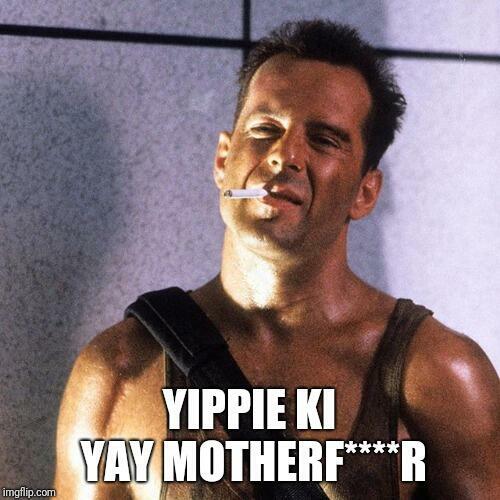
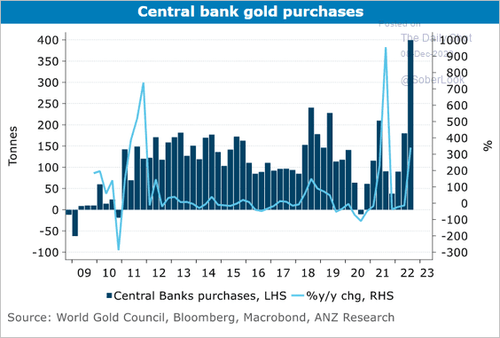
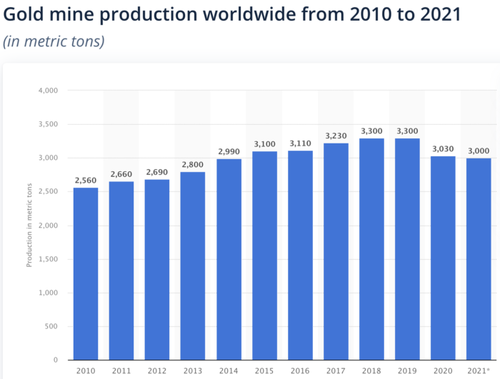
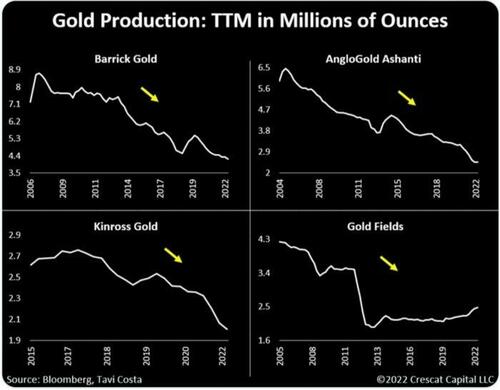
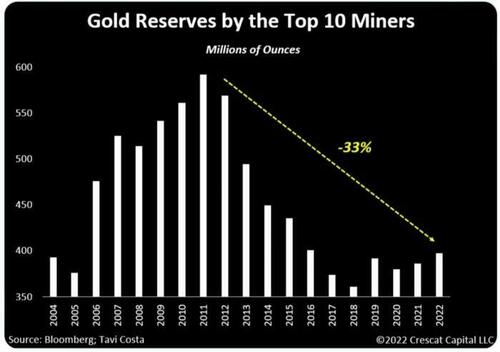
Post Comment Private Reply Ignore Thread
Top • Page Up • Full Thread • Page Down • Bottom/Latest
#1. To: Esso (#0)
With just one of those 3000 metric tons of gold I could retire comfortably, even in Biden's economy. Could even afford to eat steak a couple of times a month.
Top • Page Up • Full Thread • Page Down • Bottom/Latest